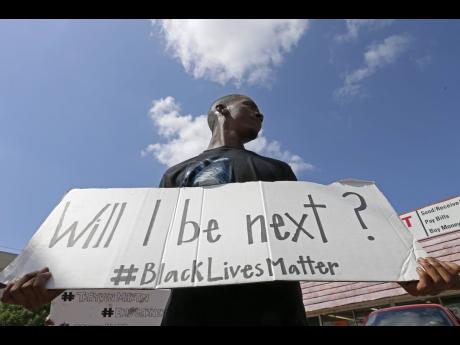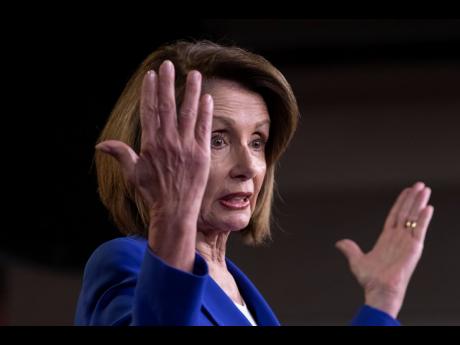Religion & Culture | The miseducation of the American negro
Economics and culture, not politics, the solution to black stagnation
The November 6, 2018 Midterm elections in the United States saw a record turnout that many pundits attributed to dissatisfaction with the current administration.
As a whole, blacks have become social justice warriors for the Democratic Party, reflexively repeating liberal talking points handed to them.
It is the Democrats that hold sacred the protective status of the LGBT community (under the umbrella of civil rights) and liberal immigration policies that dance with the notion of open borders.
Notable was the gargantuan financial backing and star-studded support behind Stacey Adams and Andrew Gillum, two liberal candidates vying for the gubernatorial seats in Georgia and Florida respectively. But do such liberal policies help black Americans?
The black American experience is a tale of a single group being systematically terrorised by its own government, a government that remains tone deaf to every black agenda.
Over centuries, the black American has been enslaved by both whites and Native Americans (the Cherokee, Chickasaw and Choctaw Indians), ‘Jim Crowed’, lynched, eugenized, persecuted from one country to another (the Black Seminoles chased from Florida to Oklahoma and later Mexico), medically experimented on (Tuskegee Syphilis Experiment 1932-1972) and suffered the loss of a generation from crack cocaine due to CIA complicity.
Every promise made immediately after slavery remains unfulfilled (40 acres, a mule and US$100 was one such promise).
Still, there appeared to be political progress from 1960 to the 1990 when the number of black elected official rose from a mere 104 to just over 9,000. But a different picture emerges when these figures are scrutinised against the backdrop of social discomfort indicators, i.e., black employment, housing, poverty, broken families, education achievement and imprisonment.
We find that despite the abundance of black politicians, the social and economic needle for blacks has not moved. In fact, Dr Martin Luther King Jr, long after his famous ‘I have a dream’ speech realised the games that Washington plays with black folks.
Rallying for the ‘Poor People’s March’, just weeks before his assassination, Dr King frustratingly demanded immediate reparations. (“Now when we come to Washington in this campaign we are coming to get our check.”) After all, every other group was receiving massive windfalls that propelled their economic interests.
Arguably, black stagnation is due to our highly flawed response to an entrenched system of bias and prejudice. For sure, the condition of the American black is hardly the result of some kind of ingrained wretchedness.
There are many chapters in Black American history characterised by ethno-aggregation and unrivalled economic prosperity. I specifically refer to the ‘Black Wall Street’ in early 1900s Oklahoma.
Note that during this period black politicians were uncommon and a black president was inconceivable.
Jose Pickens writes in Black Wall Street and the Destruction of an Institution:
“Black Wall Street was in Greenwood, Oklahoma, a suburb of Tulsa. ... It was modern, majestic, sophisticated and unapologetically black.
Two black families in Rosewood named Goins and Carrier were the most powerful. The Goins family brought the turpentine industry to the area, and in the years preceding the attacks were the second largest landowners in Levy County.
As we often saw before integration, blacks in the area created entrepreneurial opportunities for themselves, which housed an impressive business centre that included banks, hotels, cafes, clothiers, movie theatres, and contemporary homes. Greenwood residents enjoyed many luxuries that their white neighbours did not, including indoor plumbing and a remarkable school system that superiorly educated black children.”
But Black Wall Street was razed to the ground in an apoplexy of racial hatred that killed hundreds of its residents.
What stands out in Pickens’ article are the following: ‘before integration’ and ‘created entrepreneurial opportunities for themselves’.
Remarkably, black Americans, without real political representation galvanised to produce a thriving community that was the envy of racist America. Before Black Wall Street and other thriving black towns, black leaders such as Booker T. Washington, Frederick Douglas and Jamaican Marcus Garvey promoted a black economic agenda and judicial protection for blacks, while denouncing immigration, mindful of its adverse impact on black communities.
In 1879, Frederick Douglass said of the dangers of welcoming Chinese immigrants, “They would rather have labourers who would work for nothing; but as they cannot get the negro on these terms, they want Chinamen. ... The loss of the negro is to gain them the Chinese ...”
And in 1895, Washington addressed industrialists who were employing immigrant labour: “To those of you who look to the incoming of those of foreign birth ... cast down your bucket where you are ... we shall stand by you with a devotion that no foreigner can approach, ready to interlace our industrial, commercial, civil and religious life with yours.”
A century later, the advancement of blacks have been compromised by a steady movement away from these teachings. Today’s politicians, for solely political capital, have bent backwards to fight for non-documented immigrants and other special interest groups. Overtime, blacks have been duped into naively embracing these groups who have not, and will never, align themselves with the black struggle.
Case in point: I recall the 1999 police killing of Amadou Diallo, an African immigrant. I recall protesting through every borough in New York and not seeing a single Chinese, Indian, Jewish, Eastern European or so called white Hispanic immigrant among the hundreds of blacks (Caribbean, African and American) demanding justice. And I recall protesting other questionable police shootings of young black men and again being recoiled by the absence of non-black immigrants.
I have learnt though, to dust off my disappointment and face the bitter truth, that many immigrant groups bring their racism and cultural tribalism to the shores of America.
Despite their differences they understand the importance of a monolithic cultural approach to economic empowerment especially in a foreign land. They coalesce around economic agendas, mindful that money drives politics. And their interests are respected and met by political candidates because of their economic clout.
Clearly, the Civil Rights Act, now diluted, embraces all and sundry, no longer advancing the interests of those who suffered the most.
Interestingly, it is under the Obama presidency that the LGBTQ community won protective status, and the elitist white feminist movement grew long, dangerous fangs. And it is under his presidency that the mistreatment and killings of blacks spurred the Black Lives Matter movement.
Tellingly, when Democratic Speaker Nancy Pelosi was asked if she supports this movement she offered an incoherent response that lasted a mere five seconds. Interestingly, in 2018, she delivered a near record eight-hour long speech in defence of immigration and Deferred Action for Childhood Arrivals (DACA).
All the while, nationwide spate of police and civilian misconduct against non-threatening blacks are captured on cell phone videos, proving that naked racial prejudice is as ominous today as it was decades ago.
And when blacks dare to challenge America’s racist policies on the streets, the response is disproportionately militaristic, as examined in Amanda Tuan’s 2014 expose,Why America’s police force look like invading armies?
Regrettably, it is the American negro that is hoodwinked into believing that a post-racial America exists, and it is this buck dancing negro that will be in the midst of every ‘Kumbaya’ political charade planned for the upcoming elections in 2020. It is now left to the conscious black American to advance an agenda based on economic empowerment while exposing the lies and deceit of Washington.
Dr Ashby is the award-winning of the audiobook,Anam Cara: Your Soul Friend and Bridge to Enlightenment and Creativity.
Feedback: glenvilleshby@gmail.com or follow him on Twitter@glenvilleashby



